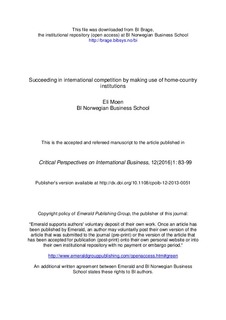Succeeding in international competition by making use of home-country institutions
Journal article, Peer reviewed
Permanent lenke
http://hdl.handle.net/11250/2382279Utgivelsesdato
2016Metadata
Vis full innførselSamlinger
- Scientific articles [2181]
Originalversjon
Critical Perspectives on International Business, 12(2016)1:83-99 http://dx.doi.org/10.1108/cpoib-12-2013-0051Sammendrag
Purpose
– This paper aims to addresses the question how a low-cost carrier (LCC) embedded in a coordinated market economy is succeeding in a highly competitive industry with a strong cost focus.
Design/methodology/approach
– This paper reports the results of a case study of a LCC (Norwegian Air Shuttle). The case study draws on both organizational and institutional theory as to how the international business environment and the national institutional framework continuously impact on its strategies.
Findings
– It is found that home-country high wage levels and strong labour regulation have been overcome by developing firm-specific capabilities based on active employee involvement which aligns with the tradition of the national system of industrial relations.
Research limitations/implications
– The present case study provides an input for further research on how actors deal with conflicting pressures. It supports the varieties of capitalism (VOC) argument that national institutional arrangements influence firms and actors’ strategies and practices, but it also supports the call within institutional theories for a more malleable conceptualizing of the link between actors and institutions than is the case in the VOC models.
Originality/value
– The paper provides an account of a successful case in a highly competitive international business despite disadvantages linked with home-country institutions.
Beskrivelse
This is the accepted and refereed manuscript to the article
